Article Overview
- The main causes of sagging skin include aging, loss of collagen, rapid weight loss, sun damage, and hormonal changes.
- Recommended at-home skincare products and ingredients for tightening skin include hyaluronic acid, Proxylane™, peptides, and antioxidants, with specific products like A.G.E. Interrupter Ultra Serum and HA Intensifier Multi-Glycan Serum.
- In-office treatments for skin tightening include Ultherapy® Non-Surgical Facelift, Thermage skin tightening, and Microneedling for Firmer Skin.
- Post-procedure care to maintain and enhance treatment results involves avoiding sun exposure, using a gentle cleanser and moisturizer, and integrating firming skincare products such as A.G.E. Interrupter Advanced and Metacell Renewal B3 Niacinamide Face Cream.
How to Tighten Skin on Face In-Office and At-Home
Loose or sagging skin on the face is a common aesthetic concern that commonly comes with aging. A variety of factors can contribute to this, but several strategies—ranging from at-home skin care to in-office treatments—can help address saggy skin leading to a more youthful complexion and firmer skin. We talked to board certified dermatologist, Dr. Mamina Turegano to understand solutions to tighten skin both in-office and at-home.
What Causes Saggy Skin?
To understand how to tighten skin on the face, we first need to understand the underlying causes of skin sagging.
Aging and Loss of Collagen
One of the primary causes of sagging skin is simply the aging process. As we age, our bodies produce less collagen and elastin, two proteins that are responsible for skin’s elasticity and firmness. This loss of collagen and elastin leads to thinner, looser skin that is more prone to sagging on the face, neck and body.
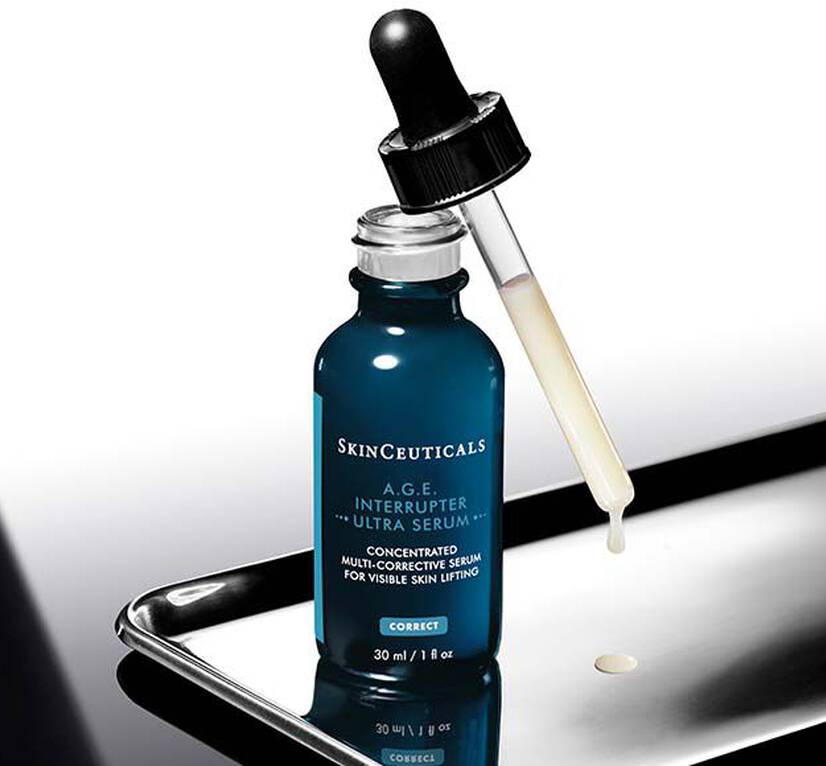
Sun Damage
Sun exposure is another major factor that can contribute to sagging skin. UV rays from the sun can damage the collagen and elastin in your skin, leading to premature aging and sagging.
Weight Loss
Weight loss can also contribute to sagging skin, especially if the weight loss is rapid and significant. The process of losing weight can result in the reduction of the supportive fat under the skin, leading to a loose, sagging appearance.
Hormonal Changes
Hormonal changes, such as those that occur during menopause, can also lead to sagging skin. When estrogen levels decline, the skin can become thinner and less elastic, which can contribute to sagging.
Skincare to Tighten Skin
There are a number of skincare products that can help to tighten skin on the face. Products like these often contain ingredients that can help to stimulate the skin's collagen production, improve skin elasticity, and reduce the appearance of fine lines and wrinkles.
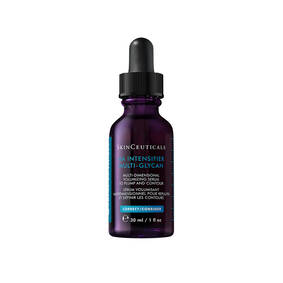
Hyaluronic Acid Intensifier Multi-Glycan Serum for Firmer Skin
Our HA Intensifier Multi-Glycan Serum is formulated with a high concentration of hyaluronic acid, a natural humectant that helps to bind moisture to the skin. It also contains 12% Proxylane™, a patented ingredient that helps to support the skin’s structure and improve its elasticity.
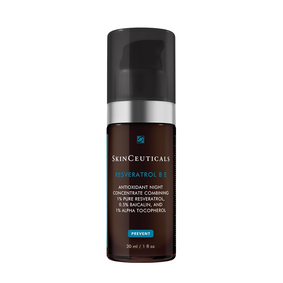
Antioxidant Resveratrol B E Nighttime Serum for Firmer Skin
The Antioxidant Resveratrol B E Nighttime Serum contains a powerful antioxidant blend of resveratrol, vitamin E, and baicalin. This combination helps to neutralize free radicals, which are damaging molecules that can contribute to skin aging. Its reconstructive properties also help to improve the skin’s firmness and elasticity.
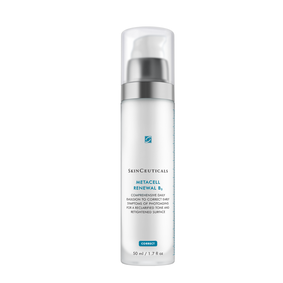
Metacell Renewal B3 Niacinamide Face Cream for Firmer Skin
Formulated with niacinamide, a form of vitamin B3 that helps to improve the skin’s barrier function and reduce the appearance of fine lines and wrinkles, Metacell Renewal B3 moisturizer can contribute to a firming skincare routine. It also contains peptides, which are amino acids that help to stimulate collagen production.
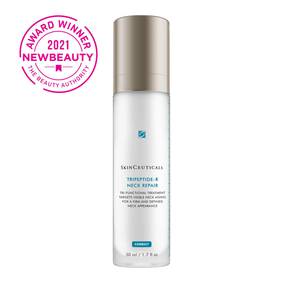
Tripeptide-R Neck Repair Neck Firming Cream for Firmer Skin
The Tripeptide-R Neck Repair Cream is specifically designed for the delicate skin of the neck. It contains a blend of retinol, peptides and hyaluronic acid to help improve the skin’s elasticity and firmness. It also helps to reduce the appearance of fine lines and wrinkles.
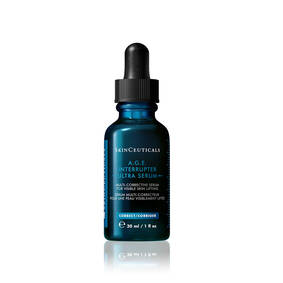
A.G.E Interrupter Ultra Serum for Firmer Skin
This is double-patented lifting serum is specifically designed to correct signs of aging caused by Advanced Glycation End products (or A.G.E.s). A.G.E Interrupter Ultra Serum is formulated with Flavo-Proxylane™ technology to help visibly tighten skin in 4 key areas from face to neck for a more sculpted appearance. This serum is physician-tested to complement the results of lifting ultrasound treatments.
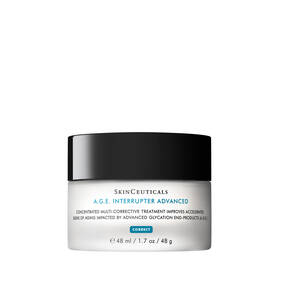
A.G.E. Interrupter Advanced for Firmer Skin
This anti-aging cream is clinically proven to help reverse visible signs of aging impacted by collagen decline and glycation, including skin laxity. A.G.E. Interrupter Advanced is formulated with a high concentration of 18% Proxylane™ to support skin’s extracellular matrix and help improve skin firmness. This cream is physician-tested to complement Radio Frequency Microneedling results.
Ingredients to Look for in Firming Skincare
When choosing skincare products to help tighten skin on the face, there are a few key ingredients to look for. These ingredients include:
- Hyaluronic acid: A powerful humectant that helps to bind moisture to the skin.
- Proxylane™: A powerful ingredient to help support skin's integrity while improving elasticity and firmness.
- Peptides: Amino acids that help to stimulate collagen production.
- Antioxidants: Ingredients that help to neutralize free radicals and protect the skin from damage.
- Retinol: A form of vitamin A that promotes skin cell turnover and collagen production, helping to reduce the appearance of fine lines and wrinkles while improving skin texture and firmness.
In-Office Skin Firming Treatments and Non-Surgical Skin Tightening
In addition to at-home skincare products, there are a number of in-office treatments that can help to tighten skin on the face. These treatments include:
- Ultherapy® Non-Surgical Facelift: This treatment uses micro-focused ultrasound energy to lift and tighten the skin on the face, neck, and chest.
- Thermage skin tightening: This treatment uses radiofrequency energy to heat the skin’s deeper layers, which stimulates collagen production and helps to tighten the skin.
- Microneedling for Firmer Skin: This treatment creates tiny punctures in the skin, which stimulates the body’s natural healing response and encourages the production of collagen and elastin.
- Ablative Laser: A skin resurfacing procedure that removes the outer layers of the skin, stimulating collagen production and new skin cell growth, which helps to tighten and firm the skin.
Post-Procedure Care for Skin Tightening
After undergoing an in-office skin tightening treatment, it is important to follow the post-procedure care instructions provided by your doctor. These instructions may include:
- Avoiding sun exposure
- Avoiding strenuous activity
- Applying a cold compress to the treated area
- Using a gentle cleanser and moisturizer, like Epidermal Repair which is dermatologist approved for post-procedure application.
Integrated Skincare: Pair Your Procedure with Firming Products
For the best results, pair your in-office skin tightening treatment with a home skincare regimen that includes firming products such as A.G.E. Interrupter Ultra Serum. This practice of integrated skincare will help to maintain and complement the results of your treatment.
To discover the best skin tightening products and treatments for your individual needs, use our online Routine Builder, or schedule an appointment with a SkinCeuticals Skincare Professional for a 1:1 virtual skincare consultation.
Next: How to Complement the Results of Collagen Remodeling Procedures
Shop Featured Products
Mamina Turegano, MD, is a triple board-certified dermatologist, internist, and dermatopathologist currently based in the United States. She completed a five-year double residency program in internal medicine and dermatology and served as chief resident at Georgetown University Hospital and MedStar Washington Hospital Center in Washington, D.C. Dr. Turegano has published articles in the Journal of the American Academy of Dermatology, Pediatric Dermatology, Journal of the American Medical Association – Dermatology, and Journal of Cutaneous Pathology. She has received multiple awards for her presentations at international dermatopathology meetings and is also a recipient of the American Society of Dermatopathology Mentorship Award.






















